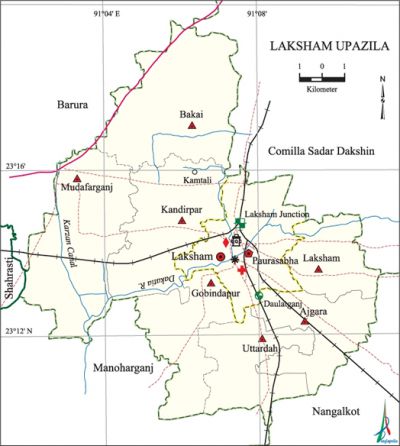Laksham Upazila
Laksham Upazila (comilla district) area 124.79 sq km, located in between 23°10' and 23°19' north latitudes and in between 91°01' and 91°11' east longitudes. It is bounded by comilla sadar dakshin and barura upazilas on the north, nangalkot and manoharganj upazilas on the south, Nangalkot and Comilla Sadar Dakshin upazilas on the east, Barura and shahrasti upazilas on the west.
Population Total 253650; male 121488, female 132162; Muslim 241548, Hindu 11609, Buddhist 464, Christian 26 and others 3.
Water bodies Main rivers: dakatia; Karzan Canal is notable.
Administration Laksham Thana was turned into an upazila in 1983. Laksham Railway Junction is one of the five biggest junctions of Bangladesh.
| Upazila | ||||||||
| Municipality | Union | Mouza | Village | Population | Density (per sq km) | Literacy rate (%) | ||
| Urban | Rural | Urban | Rural | |||||
| 1 | 6 | 104 | 139 | 70632 | 183018 | 2033 | 60.3 | 50.0 |
| Municipality | ||||||||
|
Area (sq km) |
Ward |
Mahalla |
Population |
Density (per sq km) |
Literacy rate (%) | |||
| 19.86 | 9 | 31 | 70632 | 3556 | 60.3 | |||
| Union | ||||
| Name of union and GO code | Area (acre) | Population | Literacy rate (%) | |
| Male | Female | |||
| Ajgara 84 | 3691 | 14536 | 15121 | 49.1 |
| Uttardah 87 | 3580 | 11843 | 13127 | 54.0 |
| Kandirpar 77 | 5207 | 18122 | 20299 | 45.7 |
| Gobindapur 35 | 4799 | 12515 | 14668 | 46.1 |
| Mudafarganj 63 | 5917 | 18989 | 21663 | 54.2 |
| Laksham 52 | 2735 | 10420 | 11715 | 51.3 |
Source Bangladesh Population Census 2011, Bangladesh Bureau of Statistics.

Archaeological heritage and relics Three domed Kazir Mosque, ten domed Nawab Bari Mosque, Paschimgaon Nawab Bari, three domed Afrannesa Mosque (1869), Atulchandra Zamidar Bari, Sree Sree Jagannath Bari Devalaya and Jagannath Dighi.
War of Liberation About 200 people were killed by bomb explosions by the Pak army on 6 April 1971 at Ajgara Bazar of the Upazila. During the war of liberation a number of encounters were held between the freedom fighters and the Pak army in which many Pak soldiers were killed or wounded and 17 freedom fighters were martyred. Some of the places where the encounters had taken place were Comilla Airport, Chunati, Haratali, and Aliswar. The upazila was liberated on 12 December. Mass graves had been discovered in four places (Beltala, Laksam Railway Junction, Paschimgaon, Laksam Bidi Factory) of the upazila.
For details: see লাকসাম উপজেলা, বাংলাদেশ মুক্তিযুদ্ধ জ্ঞানকোষ (Encyclopedia of Bangladesh War of Liberation), বাংলাদেশ এশিয়াটিক সোসাইটি, ঢাকা ২০২০, খণ্ড ৮।
Religious institutions Mosque 962, temple 18, tomb 7, math 1, Buddhist Vihara 1. Noted religious institutions: Arfannesa Mosque, Nawab Bari Mosque, tomb of Gazi Shaheb, Darbar Sharif at Panua, tomb of Pir Shaheb at Kaliapur, tomb of Syed Shah Waliullah Rajapuri Pir Saheb at Rajapur, Buddhist Vihara at Baraigaon.
Literacy rate and educational institutions Average literacy 51.5%; male 51.1%, female 51.8%. Educational institutions:' college 4, palli college 1, technical college 1, secondary school 70, primary school 504, community school 1, madrasa 60. Noted educational institutions:' Nawab Faizunnesa Government College, Laksham Pilot High School, Laksham Girl's High School, Harishchar Union High School, BN High School, Daulatganj Government Primary School, Gazimura Alia Madrasa.'
Newspapers and periodicals Daily: Naya Robi, weekly: Laksham Barta, Joykantha, Laksham, Alor Dishari, fortnightly: Natun Alo (defunct), weekly: Gram Bangla (defunct), monthly: Dildar (defunct).
Cultural organisations Library 8, club 2, theatre stage 1, theatre group 1, cinema hall 2.
Main sources of income Agriculture 41.40%, non-agricultural labourer 3.28%, industry 1.17%, commerce 17.77%, transport and communication 5.11%, service 14.85%, construction 1.82%, religious service 0.47%, rent and remittance 4.65% and others 9.48%.
Ownership of agricultural land Landowner 56.67%, landless 43.33%.
Main crops Paddy, potato, wheat, mustard, vegetables. Extinct or nearly extinct crops Jute.
Main fruits Mango, jackfruit, papaya, litchi, kamranga.
Fisheries, dairies and poultries Fishery 402, dairy 28, artificial breeding centre 4, hatchery 6.
Communication facilities Pucca road 96 km, semi-pucca 8 km, mud road 206 km; waterway 24 km; railway 29.57 km.
Extinct or nearly extinct traditional transport Palanquin, bullock cart, horse carriage, motor launch.
Noted manufactories Rice mill, oil mill, cigarette factory, bidi factory.
Hats, bazars and fairs Hats and bazars are 5, fairs 2, most noted of which are Chandana Bazar, Harishchar Bazar, Ajgara Bazar, Norpati Bazar, Laksam Junction Bazar, Kemtali Mela and Nurpur Mela.
Main exports Bidi, cigarette, oil.
Access to electricity All the wards and unions of the upazila are under rural electrification net-work. However 77.5% of the dwelling households have access to electricity.
Sources of drinking water Tube-well 89.3%, tap 4.4% and others 6.3%. The presence of arsenic has been detected in shallow tube-well water of the upazila.
Sanitation 75.5% of dwelling households of the upazila use sanitary latrines and 21.3% of dwelling households use non-sanitary latrines; 3.2% of households do not have latrine facilities.
Health centres Upazila health complex 1, hospital 8, mother and child health centre 1, clinic 4, family planning centre 14, satellite clinic 8.
NGO activities Operationally important NGOs are brac, Swanirvar Bangladesh, UNDP, asa, proshika. [Muhammad Nur E Alam Siddiqi]
Reference Bangladesh Population Census 2001 and 2011, Bangladesh Bureau of Statistics; Cultural survey report of Laksham Upazila 2007.
